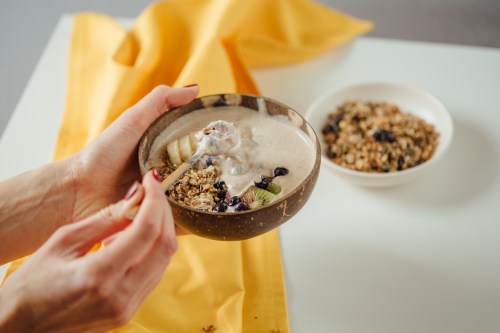Katherine Heigl Wants Her Kids to ‘Slay Their Own Dragons’
Plus, everything she's learned about motherhood so far.

At 46, Katherine Heigl is focused on motherhood and stepping away from the silver screen—at least for now. Now residing in Utah, she’s been quoted as taking some time away from Hollywood to be able to focus on her main priority: being a mom. From starring in numerous romantic comedies such as 27 Dresses and The Ugly Truth, the Emmy Award winner has been nothing but booked. But now, with three children, the Grey’s Anatomy and Suits star is continuing to keep herself busy in a completely different way.
Heigl sat down with us to talk about that innate pressure that mothers put on themselves to be perfect for their children, but if she could go back, she would tell herself not to take everything so seriously. A main theme in the actress’s advice to mothers (and to herself) was being kinder and more patient with yourself. After all, motherhood is no small feat.
Life as a Mom, as she knows it
“I remember how intensely I took everything with my first [child], from diaper cream to diaper wipes to what they were eating, Heigl explains. “If you put that kind of pressure on yourself to be this perfect parent, you’re just going to disappoint yourself over and over because nobody is perfect.”
And here's why self-compassion is so key: Adjusting to motherhood might take longer than you think. According to a study published in Sexual and Reproductive Healthcare, new mothers took around six months to settle into their roles and routines.1
“It’s important to have compassion for yourself while dealing with this time raising your child," Heigl says. "You’re not going to have it all together with the blink of an eye.” And you don't have to, either.
Another study also highlighted the high pressure that mothers feel to be perfect at parenting.2 But the need for perfection and putting these high expectations on yourself (or your kids) can often lead to burnout.
“I think sometimes we can get very caught up in what we think their lives should look like and what we think they should do and what we think they should be…and [parenting is] really not about that," she says. "It's about helping them to figure that out for themselves. And as they become adults, to go slay their own dragons. That's what you want for your children.”
How to handle the pressures of motherhood
Let's be real: Being a parent can be stressful. But, taking care of yourself is just as important as taking care of your children. While some parents use strategies like meditation or journaling, Heigl says she turns to prayer.
“I have a prayer I do almost every day—that I have the inspiration and grace and support to be the right mother for each of my children and their individual needs," she explains. Heigl emphasizes that each of her three kids is “so uniquely themselves” and that she tries to approach raising each of them differently and cater to who they are as people. “You can’t be the exact same mother for each of them.”
But oftentimes, it’s hard to take care of other human beings when you haven’t had time for yourself. “It’s tough trying to find that balance," Heigl says. The advice that she gives to others (and also tries to follow herself)? You have to give yourself at least an hour to take care of you. And for Heigl, that’s reading, writing, painting, or even just scrolling on TikTok.
The physical changes of becoming a mother
Outside of practicing and preaching self-compassion as a parent, Heigl is also an advocate for speaking up about the bodily changes that you often go through when becoming a mother. Sure, many of us know about the obvious changes during pregnancy, like mood swings or changes in weight. But there are aspects of postpartum that people don't always discuss.
And one experience that Heigl has lived through after entering motherhood? Bladder leakage. Medically known as urinary incontinence, bladder leakage is an extremely common symptom that you might have during pregnancy and postpartum. The leakage typically happens as a result of the weakening of the muscles you use for pregnancy and childbirth.
In attempts to normalize bladder leakage as a common postpartum symptom, Heigl has partnered with Poise as a brand ambassador and appears in a commercial for the pad brand. She even coined the term "giggle dribble," which alludes to the bladder leakage that may occur when postpartum moms laugh. “I think the most important thing we can do for each other is talk about it, openly and without shame," Heigl emphasizes.
Heigl isn't alone in her experience, either. Research estimates that 25 to 55 percent of pregnant people experience bladder leakage. A study published in Medicine found that 34 percent of moms who were three months postpartum dealt with varying degrees of urinary incontinence. Of these women, 3 percent had bladder leakage daily, and 8.5 percent needed to wear pads or panty liners.3
But Heigl has a great attitude about her postpartum symptoms, and wants you to keep perspective. “It's just a part of the process as we age and our bodies change, because the alternative to aging is being dead," she says. "So let's be grateful we're still alive and still experiencing this life in this existence of all that is—and not begrudge these changes. They're just a part of being alive.”
However, just because you're experiencing these symptoms doesn't mean you can't find relief for them. If you're dealing with urinary incontinence after childbirth, support is available. Your healthcare provider may recommend a variety of treatments, such as strengthening your pelvic floor, taking medications, or making lifestyle changes like avoiding foods and drinks that can further irritate your bladder. For individualized health advice, reaching out to your care team is a great place to start.
Her plans for Mother's Day
With Mother’s Day just around the corner, Heigl explains that she doesn't exactly know what her plans are just yet. With a close relationship with her mother, she hopes to take advantage of living near her and be able to spend the day with her mom. Heigl says her life has been very "go, go, go" that she'd like to just have a relaxing day with her loved ones. What better way to celebrate, right?
- Kristensen, Ingeborg Hedegaard, et al. “First-time Mothers’ Confidence Mood and Stress in the First Months Postpartum. A Cohort Study.” Sexual & Reproductive Healthcare, vol. 17, June 2018, pp. 43–49. https://doi.org/10.1016/j.srhc.2018.06.003. ↩︎
- Venard, Gaëlle, et al. “Parenting Under Pressure: Associations Between Perceived Social Pressure and Parental Involvement Among Mothers and Fathers.” Journal of Child and Family Studies, vol. 33, no. 12, Nov. 2024, pp. 3813–25. https://doi.org/10.1007/s10826-024-02945-5. ↩︎
- Gao, Jiejun, et al. “Risk Factors of Postpartum Stress Urinary Incontinence in Primiparas.” Medicine, vol. 100, no. 20, May 2021, p. e25796. https://doi.org/10.1097/md.0000000000025796. ↩︎










